Share
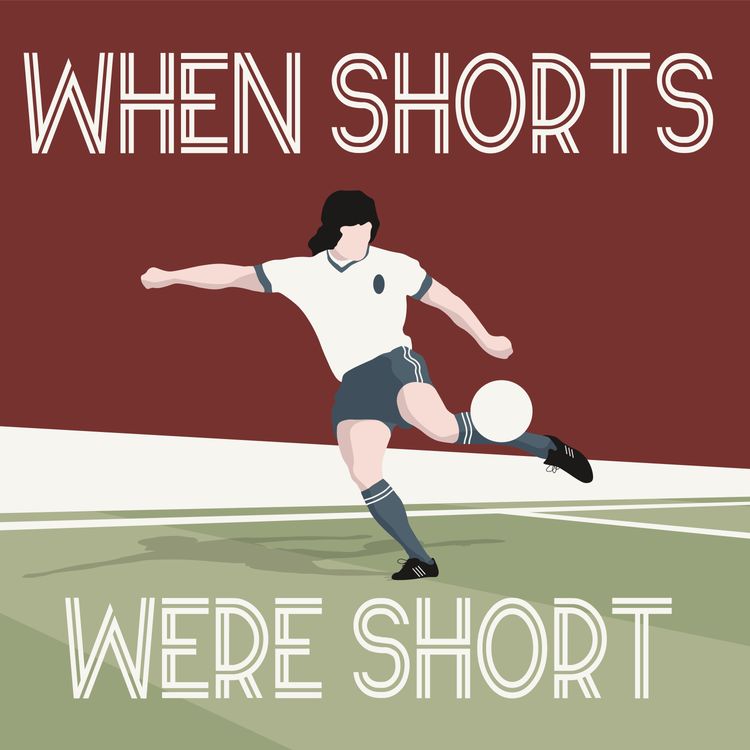
When Shorts Were Short
When Shorts Were Short S3 E22 - ALISTAIR ROBERTSON WBA and Wolves
When Shorts Were Short concerns itself solely with what was actually a very narrow window in football history when teams wore, well, short shorts. The podcast takes 1954 as its starting point, when Umbro made their first England kit with shorter shorts, to 1992, when short shorts were all but finished as Umbro's baggy shorts for Tottenham's new kit, ahead of the '91 FA Cup Final, quickly caught on.
If the shorts weren't short, we don't talk about it.
There’s not many players who can say they’re cherished by both West Bromwich Albion and Wolves supporters but this week’s guest made a combined 762 appearances for both, 626 for the Baggies and for 136 for the side in famous old Gold who could not have been more in the doldrums when they were when he joined them in 1986.
Alistair Robertson spent 18 years at the Hawthorns and after an initial stop-start time with the club, his Albion career really got going when Johnny Giles arrived as player-manager for his first spell in charge in 1975 and for eight seasons, him and John Wile formed an outstanding partnership at the heart of the defence as Albion secured third and fourth place finishes in the late seventies and early 80s and reached the last eight of the UEFA Cup in 1979.
While most would trace the club’s decline to Ron Atkinson’s move to Man Utd in the summer of ’81, taking Remi Moses and more importantly, Bryan Robson with him, Alistair has a very interesting different take on this.
After a disappointing end to his time with the Albion, where after nearly two decades of service, he deserved a much better send off, Alistair moved to Wolves in 1986 after WBA’s relegation. Wolves could not have been more of a mess, languishing in the bottom division but under Graham Turner and the captaincy of this week’s guest, Wolves secured back to back promotions and won the 1988 EFL trophy at Wembley before Alistair’s retirement in 1990.
Twitter @shortswereshort
Instagram @shortswereshort
Facebook shortswereshort2023
Support Ko-fi
Threads @shortswereshort
More episodes
View all episodes
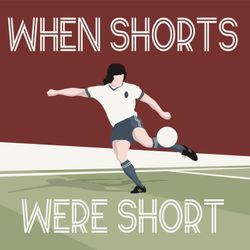
21. When Shorts Were Short S3 E21 - Dave Bowler (Classic Kits 1954-92)
42:39||Season 3, Ep. 21When Shorts Were Short concerns itself solely with what was actually a very narrow window in football history when teams wore, well, short shorts. The podcast takes 1954 as its starting point, when Umbro made their first England kit with shorter shorts, to 1992, when short shorts were all but finished as Umbro's baggy shorts for Tottenham's new kit, ahead of the '91 FA Cup Final, quickly caught on. If the shorts weren't short, we don't talk about it.Writer and podcaster Dave Bowler returns to the show to choose his three classic kits from the 1954-92 era. Follow Dave on Twitter @MagicofFACupAnd find all his books hereTwitter @shortswereshortInstagram @shortswereshortFacebook shortswereshort2023Support Ko-fiThreads @shortswereshortYouTubeDiscord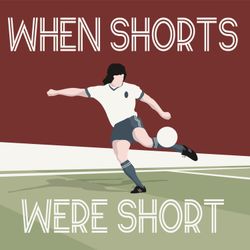
When Shorts Were Short S3 E20 Stuart Horsfield - Brazil '82
01:50:45|When Shorts Were Short concerns itself solely with what was actually a very narrow window in football history when teams wore, well, short shorts. The podcast takes 1954 as its starting point, when Umbro made their first England kit with shorter shorts, to 1992, when short shorts were all but finished as Umbro's baggy shorts for Tottenham's new kit, ahead of the '91 FA Cup Final, quickly caught on. If the shorts weren't short, we don't talk about it.On the 14th of June 1982, a day after the 1982 World Cup kicked off in Spain, Argentine forces surrendered and the British flag was raised on West Falkland to signal the end of the conflict, news if I remember rightly that broke either just before Brazil and the Soviet Union took to the field or during the game itself. Either way, for anyone watching that game, I don’t think too many minds were on the Falklands because we were watching something extraordinary unfold. And up on the Yorkshire coast, in Scarborough, a small boy was watching the match too, and while up and down the country, boys spent the rest of the summer pretending to be Zico, Eder, Socrates and co, for this boy it went a little deeper. That game against the Soviets left him bewitched by the men in yellow and Telê Santana’s men would continue to thrill, their fragility at the back increasingly evident along the way. A complicated format involving a second group stage shouldn’t have been too difficult to navigate, but instead Brazil would find themselves in arguably the Group of Death to top all Group of Deaths. The semi-finals would elude them, perhaps adding to the myth that had quickly built up around that team and Brazil ’82 would go the same way as Hungary ’54 and the Netherlands 20 years later, forever doomed to be labelled as one of, if not the greatest, side to never win the World Cup. And for that young boy in Scarborough, the memory of the summer of ’82 would never leave him.Follow Stuart on Twitter @loxleymisty44And find Stuart's book here 1982 Brazil: The Glorious FailureTwitter @shortswereshortInstagram @shortswereshortFacebook shortswereshort2023Support Ko-fiThreads @shortswereshortYouTubeDiscord
19. When Shorts Were Short S3 E19 GARRY THOMPSON - Coventry, WBA, Sheff Wed, Villa, Watford, Palace, QPR
01:51:16||Season 3, Ep. 19When Shorts Were Short concerns itself solely with what was actually a very narrow window in football history when teams wore, well, short shorts. The podcast takes 1954 as its starting point, when Umbro made their first England kit with shorter shorts, to 1992, when short shorts were all but finished as Umbro's baggy shorts for Tottenham's new kit, ahead of the '91 FA Cup Final, quickly caught on. If the shorts weren't short, we don't talk about it.A handful for defenders AND managers, Garry Thompson, the ex-Coventry, WBA, Sheffield Wednesday, Aston Villa, Watford, Crystal Palace and QPR striker looks back at his career and off-the-pitch, some huge personal losses that rocked him. A boyhood Villa fan, Garry broke through at Highfield Road in the late 70s at a time when racial abuse was rife - as it would continue to be for decades. A bad injury early in his career, Garry tells us, robbed him of perhaps being the player that he should've been, but nevertheless, during his peak years in the mid-80s at WBA, he did come close to England selection and in 1988, was part of Graham Taylor's Villa side that won promotion back into the top flight at the first time of asking.Follow Garry on Twitter @Thompson1GarryAnd find Garry's book 'Don't Believe A Word' is available here and in all good bookshops.Twitter @shortswereshortInstagram @shortswereshortFacebook shortswereshort2023Support Ko-fiThreads @shortswereshortYouTubeDiscord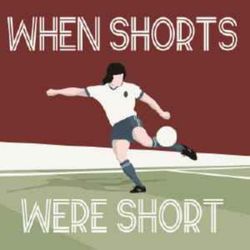
18. When Shorts Were Short S3 E18 - Dave Bowler on Alf Ramsey and Ipswich Town 1955-63
01:23:58||Season 3, Ep. 18When Shorts Were Short concerns itself solely with what was actually a very narrow window in football history when teams wore, well, short shorts. The podcast takes 1954 as its starting point, when Umbro made their first England kit with shorter shorts, to 1992, when short shorts were all but finished as Umbro's baggy shorts for Tottenham's new kit, ahead of the '91 FA Cup Final, quickly caught on. If the shorts weren't short, we don't talk about it.A fine fullback in Arthur Rowe’s seminal push and run side of that decade, Alf Ramsey had seen his England career abruptly end following Hungary’s sensational 6-3 win at Wembley in November 1953 and he took over at Portman Road in 1955. Ipswich were then in Division 3 South, and had, incredibly, only been elected into the Football League as recently as 1938. Under Ramsey, just seven seasons later, Ipswich, the 1961-62 season their first in the top flight, and built on a strong defence marshalled by Roy Bailey in goal who would serve the club for nine seasons, and a frontline of the frail looking left winger Jimmy Leadbetter and the prolific Ray Crawford and Ted Phillips, were League Champions. The following season, the club were almost relegated, staying up by just four points, a sign of things to come. By the ’63-64 season, Ramsey was in the England job and Ipswich, under his successor, Jackie Milburn, fell back into Division Two.Writer and podcaster, Dave Bowler is one of the few writers to cover this period in Ipswich’s history, his Winning Isn’t Everything: A Biography of Sir Alf Ramsey arguably the best volume out there on what is a surprisingly poorly covered chapter of English football history, even by Ipswich itself. And Dave, in this interview, gives me his theory as to why this might be.Follow Dave on Twitter @MagicofFACupAnd find all his books hereTwitter @shortswereshortInstagram @shortswereshortFacebook shortswereshort2023Support Ko-fiThreads @shortswereshortYouTubeDiscord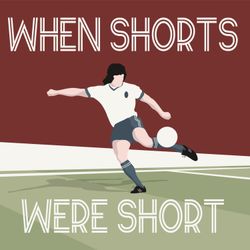
17. When Shorts Were Short S3 E17 - LEIGHTON JAMES (Wales, Burnley, Derby, QPR, Swansea, Sunderland, Bury and Newport)
01:27:50||Season 3, Ep. 17When Shorts Were Short concerns itself solely with what was actually a very narrow window in football history when teams wore, well, short shorts. The podcast takes 1954 as its starting point, when Umbro made their first England kit with shorter shorts, to 1992, when short shorts were all but finished as Umbro's baggy shorts for Tottenham's new kit, ahead of the '91 FA Cup Final, quickly caught on. If the shorts weren't short, we don't talk about it.“I’m like the Ayatollah – back out of exile.”That great line was uttered by left winger Leighton James, actually one of the best two-footed wingers in the British game during the 70s, when he returned to the Wales team after a long period out and helped take England apart 4-1 in May 1980 in what was manager Mike England’s first game in charge of Wales. To put that game into context, just four days earlier at Wembley, England had convincingly defeated world champions Argentina.Breaking through as a 17-year-old in late 1970 for the club of his life Burnley, James had won his first cap for Wales a year later and would, in a 12-year career for the national team, score 10 goals in 54 appearances. Twitter @shortswereshortInstagram @shortswereshortFacebook shortswereshort2023Support Ko-fiThreads @shortswereshortYouTubeDiscord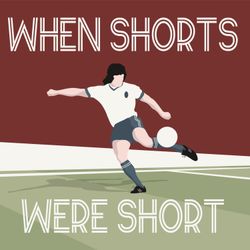
16. When Shorts Were Short S3 E16 Steven Scragg - Liverpool '81 - 82 (Paisley's Greatest Moment?)
01:44:36||Ep. 16When Shorts Were Short concerns itself solely with what was actually a very narrow window in football history when teams wore, well, short shorts. The podcast takes 1954 as its starting point, when Umbro made their first England kit with shorter shorts, to 1992, when short shorts were all but finished as Umbro's baggy shorts for Tottenham's new kit, ahead of the '91 FA Cup Final, quickly caught on. If the shorts weren't short, we don't talk about it.It's the summer of 1981.For the best part of four seasons, a Liverpool side that both domestically and on the European stage, had battled for supremacy with Nottingham Forest, had a starting eleven that rolled off the tongue regardless of whether you were a Liverpool fan or not. 1 to 11, Clemence, Neal, Alan Kennedy, Thompson the captain, Ray Kennedy, Hansen, Dalglish, Case – from ’80-81 sidelined by Lee – Johnson, McDermott and Souness. But by '81-82, Paisley’s greatest side, probably the finest in Liverpool’s history, had begun to break up.Steven Scragg, author, journalist and heavyweight podcaster who more often than not anchors the outstanding These Football Times, is my guest this week. One of the most authoritative voices on Liverpool out there, Steven has written on Liverpool’s dramatic ’81-82 season and was the obvious name to walk us through what may well have been Bob Paisley’s finest moment.Find Steven on Twitter @Scraggy_74And his football books are available online and all good bookshops.Twitter @shortswereshortInstagram @shortswereshortFacebook shortswereshort2023Support Ko-fiThreads @shortswereshortYouTubeDiscord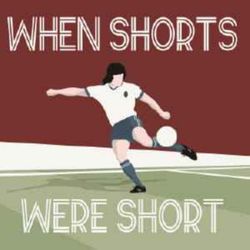
When Shorts Were Short S3 E15 - KENNY HIBBITT (Wolves, Coventry and Bristol Rovers)
01:31:53|When Shorts Were Short concerns itself solely with what was actually a very narrow window in football history when teams wore, well, short shorts. The podcast takes 1954 as its starting point, when Umbro made their first England kit with shorter shorts, to 1992, when short shorts were all but finished as Umbro's baggy shorts for Tottenham's new kit, ahead of the '91 FA Cup Final, quickly caught on. If the shorts weren't short, we don't talk about it.A leading light in that Wolves side of the seventies and first half of the 80s was Kenny Hibbitt, a goalscoring midfielder, who wore the old gold with distinction for 16 years. A club legend, and I don’t use the word lightly. A guy who, as he tells us, played for the love of the game, and wasn’t motivated by money, turning down several opportunities to leave Moulineux during his long span of service with the club. We look at the missed opportunities for Wolves to kick on from a position of strength after the League Cup successes of ’74 and ’82 and the darkness that swallowed up the club in the early to mid-80s. Kenny runs us through his entire playing career, from the early days at Bradford Park Avenue to the final seasons at Bristol Rovers and the first chunk of his management career at Walsall. Twitter @shortswereshortInstagram @shortswereshortFacebook shortswereshort2023Support Ko-fiThreads @shortswereshortYouTubeDiscord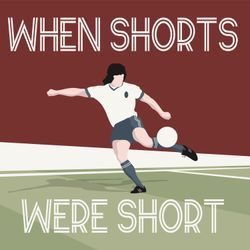
14. When Shorts Were Short S3 E14 - Paul McParlan (Classic Kits 1954-92)
30:40||Season 3, Ep. 14When Shorts Were Short concerns itself solely with what was actually a very narrow window in football history when teams wore, well, short shorts. The podcast takes 1954 as its starting point, when Umbro made their first England kit with shorter shorts, to 1992, when short shorts were all but finished as Umbro's baggy shorts for Tottenham's new kit, ahead of the '91 FA Cup Final, quickly caught on. If the shorts weren't short, we don't talk about it.Author Paul McParlan selects his three classic kits from the 1954-92 era. You can find Paul's book here 'The Forgotten Champions: Everton's Last Title' and elsewhere online and of course, in all good bookshops.Twitter @shortswereshortInstagram @shortswereshortFacebook shortswereshort2023Support Ko-fiThreads @shortswereshortYouTubeDiscord